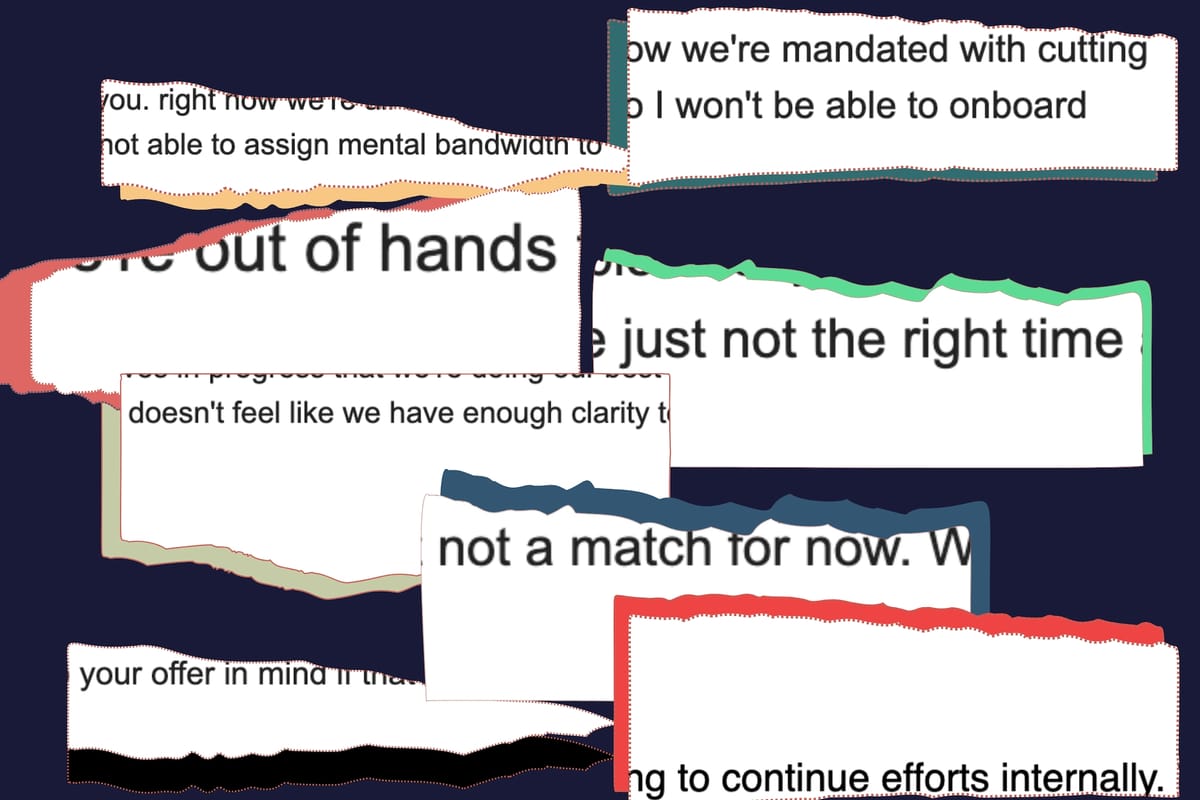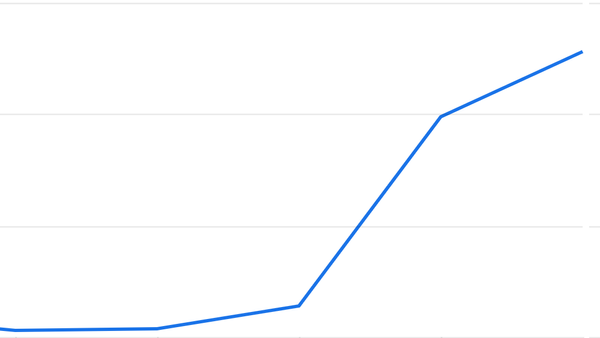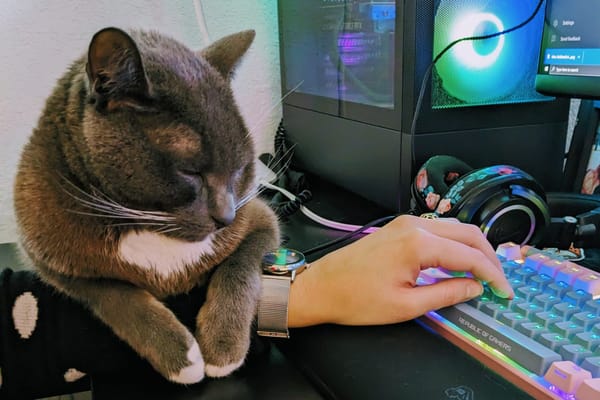I can’t take this anymore.
If you are doing sales, you should never show how much you care about an opportunity. If you tell the other party how badly you want a deal, they will think you’re desperate. When they think you’re too needy, you’ll lose any chance of hearing a “yes”.

It’s Mental Health Awareness Month, so I will take that as a free pass to act mentally unstable for a minute. I do have a diagnosis, might as well earn it ;)
I can’t take this anymore.
I don’t know if I can keep going with this terrible charade that millions of humans seem to have accepted in business. I don't want to participate in the cruel performance of professionalism that requires the absence of emotion.
Professionalism is kind of messed up
I am constantly told to be less emotional in my professional interactions. “It’s just business, stop taking everything so personally.” Rejection is expected. Getting attached is naive. Caring is a weakness.
If you are doing sales, you should never show how much you care about an opportunity. If you tell the other party how badly you want a deal, they will think you’re desperate. When they think you’re too needy, you’ll lose any chance of hearing a “yes”.
Why are we making decisions on who to work with based on the same social principles as some fucking prison?
I struggled to even find the right metaphor for that previous sentence. Initially, I wanted to write “pick-up artists”, but to be honest even they tend to at least directly express their interest. In business though, telling someone how much you’d like to see someone again will raise eyebrows.
I don’t think those who perpetuate these behaviors are bad people. Some of the people I love most in this life are professional connections, and I’ve seen all of them act this way too.
No, this isn’t an attack on any one person. Instead, I’m angry about the status quo that all of us continue to maintain.
And I think you, the reader, need to join me in feeling that anger. Because this status quo wasn’t one any of us picked out. We’re performing the same social scripts that were established generations before us. Workplace norms created by people who haven’t been in the workforce for decades.
We’ve been shedding the shackles of those people’s politics. But we continue to celebrate the ways they perceived work.
Why is rejection “normal”?
Yesterday, I spent an hour hysterically sobbing on the floor because I heard three “no”s to my proposals. And I know that you probably think I’m childish for taking rejection so seriously. But can you, my reader, at least try to think about why that is?
Entertain me for a minute. Ask yourself why we shouldn’t feel upset about rejection in a professional context.
I’d like to hear a real explanation.
Because this attitude towards rejection is a deeply unnatural one. Humans want to belong, cooperate with others, make bonds, and work towards bigger goals. We're kind of wired to hate rejection, and in most contexts we recognize it as a painful loss.
In most parts of our lives, we do not treat rejection as a default. Because rejection shouldn’t have to be the default.
Then why do we live in a world where people can spend months discussing the work that they could do together, only for that door to get slammed shut because of trivial details?
Come on, most reasons why projects get rejected are pretty silly:
- Not enough budget – budgets aren’t passed down through some divine law. If a price is off, it can be negotiated. If a business doesn’t have enough liquid cash available, it can make a plan to adjust expenses and increase revenue to make that investment possible.
- Not the right time – while a particular date can be inconvenient, other options can still be agreed upon. When we want to get lunch with a friend and they propose a bad time, we don’t shut the door on ever getting lunch with them again. We simply tell them what alternative times could work better.
- Not the right scope – again, this can be discussed and negotiated. If you and your friend can’t agree on the restaurant to get lunch, you will simply talk about options until you reach a compromise.
Most of these situations are simply disagreements as to the exact logistics of how to work together. They have no impact on what the two parties think of each other, whether one business can provide a helpful product or service, or whether another business has a problem worth solving.
Whatever may change in the budget, timeline, or scope - most factors remain the same:
- One business has a problem they need help with
- Another business can provide a solution to that problem
- Both businesses like each other enough to try to figure out how to work together.
Those are the prerequisites needed to get to logistical sales discussions to begin with. So why do so many deals end up lost over trivial details ?
We keep hurting ourselves and our own organizations
For some reason, we’ve been taught to think of every business decision as an unequal exchange of value.
We expect the other party to screw us over, gain leverage, or “possess a strategic advantage”: whatever level of formality used to describe it, we expect one party in a negotiation to try and hurt the other. We see business as a cruel dog-eat-dog world where others are simply sniffing out weaknesses and waiting to pounce.
So of course, if we presume other people are out to harm us, we will look for a reason to stop exposing our vulnerabilities. And when a negotiation requires actual open communication about our capacity, needs, and desires – we switch to the defensive, freeze up, and then bolt.
We don’t want anyone to see the weird dents in our appearance, and we hide wrinkles in our operational capacity. We talk about pain points, but can’t stand the idea of letting someone witness our bruises.
We never let other businesses catch us “naked”.
Even if we have a potentially cancerous mole on our metaphorical business back, we’ll refuse to get it examined. Even if another business has all the licenses to treat those exact kind of blemishes, we’ll refuse their help. They might give us a hand, but we’ll push them away and put on more layers.
We will hide every inch of our actual opinions and suck up the ever-increasing chances that our short-term fear of doctors could land us in mortal trouble.
The status quo won’t help you succeed
One of the most frustrating aspects of this whole dynamic is that choosing not to pursue opportunities doesn’t help anybody!
If your objective is to grow, then actively refusing to try a marketing campaign prevents you from ever seeing a lift in brand awareness or conversions.
If your objective is to increase customer satisfaction, maintaining the same number of support reps won’t get any tickets answered faster.
If your objective is to optimize loading speeds, keeping a known bug in the code won’t improve your app's performance.
When we say no to potential projects or investments because we couldn’t perfectly align on the details, we lose any benefits that we could have had from an imperfect solution. We agree that any progress is better than none, right? Yet our fear of signing on the dotted line prevents the possibility of improvement happening at all.
- You’re a character in an RPG
- In a previous battle, you got hit by an enemy who made you lose 50 of your “business health points” (or business HP)
- You pass by a merchant NPC, who happens to sell a potion that recovers 50 business HP
- You don’t have enough coins to immediately purchase said potion.
A. Buy a cheaper potion that heals 25x business HP
B. Earn more coins from winning battles to afford the potion
C. Sell some of your leftover inventory to afford the potion
D. Go on with the game hoping you’ll be fine.
Most of us would choose between options A-C. Because objectively, option D is the worst one. Unless your game includes full healing at checkpoints, getting a potion is likely the best decision.
And here’s the secret - the real world doesn’t offer even partial healing at checkpoints. We don’t even have save files, actually.
So why are we constantly choosing option D? And why are we supposed to just act like that’s shrewd business judgment?
I’m sick of it.
When we reject, we all lose
And the worst part of all this?
The most painful part of it is that when someone rejects your proposal, you don't get to talk to them much anymore. You could have had the chance to work alongside incredible people, built stronger connections, learned from each other, helped your businesses, and created something beautiful together.
But instead, all that love is killed before it can ever emerge. And the world as a whole is left a little sadder when both parties repress any hope they might have felt prior. Any dreams of a better tomorrow get extinguished by the weight of one small detail on page 3 of a slide deck or a PDF.
Anyway, I’ll go back to pretending that I don’t fall in love with the sales proposals I send out. But I truly wish I didn’t have to.
Top 3 Reading Recommendations
- “Why Highly Efficient Leaders Fail” by Rebecca Zucker. Focusing on tasks and sacrificing relationships can make leaders less effective, and this piece shows why.
- . “Chasing Social Media Algorithms Is Out — Community Is in” by Paul Sullivan. I always like to say that content is relationship-building at scale. And I like the idea of looking at social media as, well… “social”.
- “The problem with B2B marketing: Misaligned measurement is stifling innovation” by Liam Moroney. Liam is one of the smartest people I know, and his articles are so so so good. I love every take on marketing that he’s ever shared.
Musical Minute
“Applause“ by Lady Gaga.
I’m having a Lady Gaga phase. To be honest, I forgot just how good her music really is, and rediscovering it has brought me a lot of joy. And this song is SO GOOD!
“Give me that thing that I love (I'll turn the lights out)
Put your hands up, make 'em touch, touch (Make it real loud)
Give me that thing that I love (I'll turn the lights out)
Put your hands up, make 'em touch, touch (Make it real loud)
Make it real loud”
I shall now make my exit humming and clapping to the beat 💃





